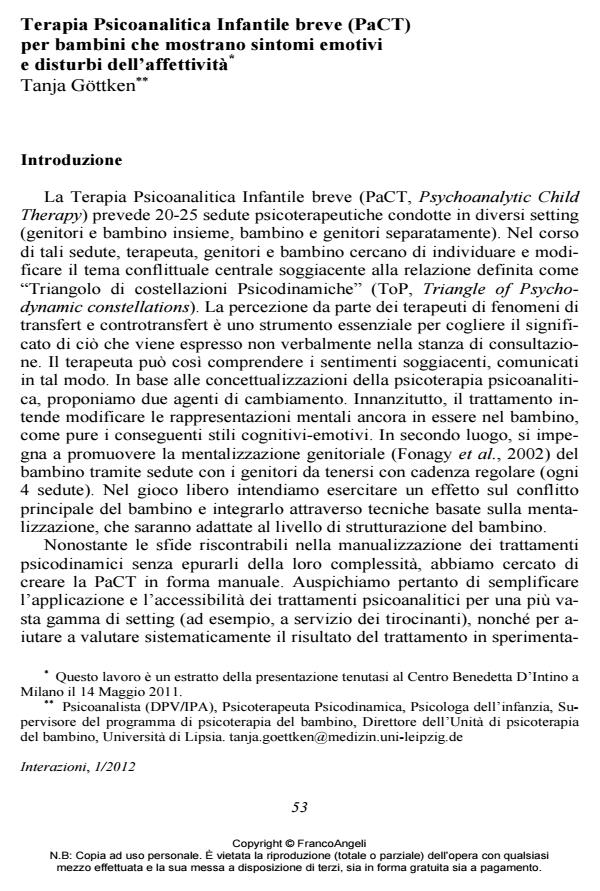Brief Psychoanalytic Child Therapy (PACT) for children showing emotional symptoms and affective disorders
Journal title INTERAZIONI
Author/s Tanja Gottken
Publishing Year 2012 Issue 2012/1
Language Italian Pages 16 P. 53-78 File size 333 KB
DOI 10.3280/INT2012-001005
DOI is like a bar code for intellectual property: to have more infomation
click here
Below, you can see the article first page
If you want to buy this article in PDF format, you can do it, following the instructions to buy download credits

FrancoAngeli is member of Publishers International Linking Association, Inc (PILA), a not-for-profit association which run the CrossRef service enabling links to and from online scholarly content.
Brief Psychoanalytic Child Therapy (PaCT) comprises 20-25 psychotherapeutic sessions conducted in alternating settings (parent-child together, child and parent, individually) (Göttken e Von Klitzing, 2012). During these sessions, therapist, parent, and child seek to identify and modify the core conflictual theme underlying the relationship, which we term the "Triangle of Psychodynamic constellations" (ToP). Pursuant to psychoanalytic therapeutic concepts, we propose two causative agents of change. First, the treatment aims to revise extant mental representations in the child as well as the attendant cognitiveemotional styles. Second, it strives to promote parental mentalization (Fonagy et al., 2002; Verheugt-Pleiter, Zevalkink e Schmeets, 2008) of the child through regular parent-sessions (every 4th session). In free play, we aim to work through the child’s core conflict and complement this with mentalization-based techniques, tailoring it to the child’s level of structuralization. The so-called "Triangle of Psychodynamic constellations" (ToP) - formulated during the first five sessions - serves as an (inner) aid and guides the therapist in his/ her attempts to integrate the diverse pieces of information provided by parent, child as well as his/ her own perception. In effect, this will permit consideration of the child’s symptoms in terms of an "interpersonal symptom of its object-relations". Our treatment approach is rooted in the assumption that children with affective disorders fail to express their aggressive impulses interpersonally in their primary caregiver-relationships, but instead turn them inwards against the self. This induces an intrapsychic conflict whereby the object is spared, at the expense of (persecution of) the self, thereby disrupting the latter’s developmental progress. The author illustrates the concept by means of case material of a 5 year old boy.
Keywords: Brief Psychoanalytic Child Therapy (PACT), children with emotional disorders, parent work.
Tanja Gottken, Terapia Psicoanalitica Infantile breve (PaCT) per bambini che mostrano sintomi emotivi e disturbi dell’affettività in "INTERAZIONI" 1/2012, pp 53-78, DOI: 10.3280/INT2012-001005